Sputnik V: Frequently asked kitty questions
A celebratory Q&A to mark the 4th birthday of Russia's flagship COVID vaccine!
Today marks the fourth birthday of Sputnik V, the “world’s first registered COVID vaccine”.
In celebration of this momentous anniversary, your correspondent spoke with Susan the cat about Russia’s safe and effective contribution to global health.
I hope you enjoy this educational interview with my cat.
— Edward
Susan: When Putin unveiled Sputnik V to the world four years ago, he claimed that the vaccine “worked quite effectively” and had “passed all the necessary tests.” I am a cat and therefore curious by nature, so I would like to know: What kind of tests are we talking about here?
Edward: The drug that later became Sputnik V was granted emergency use authorization in Russia after a two-month trial involving 76 individuals.
Susan: How can a vaccine “pass all the necessary tests” in two months?
Edward: Good question, Susan. It can’t. It would be physically impossible for a vaccine to do that, actually.
Phase I trials typically last for two years. Then there’s another 5-10 years of testing before a vaccine can even be considered for public use.
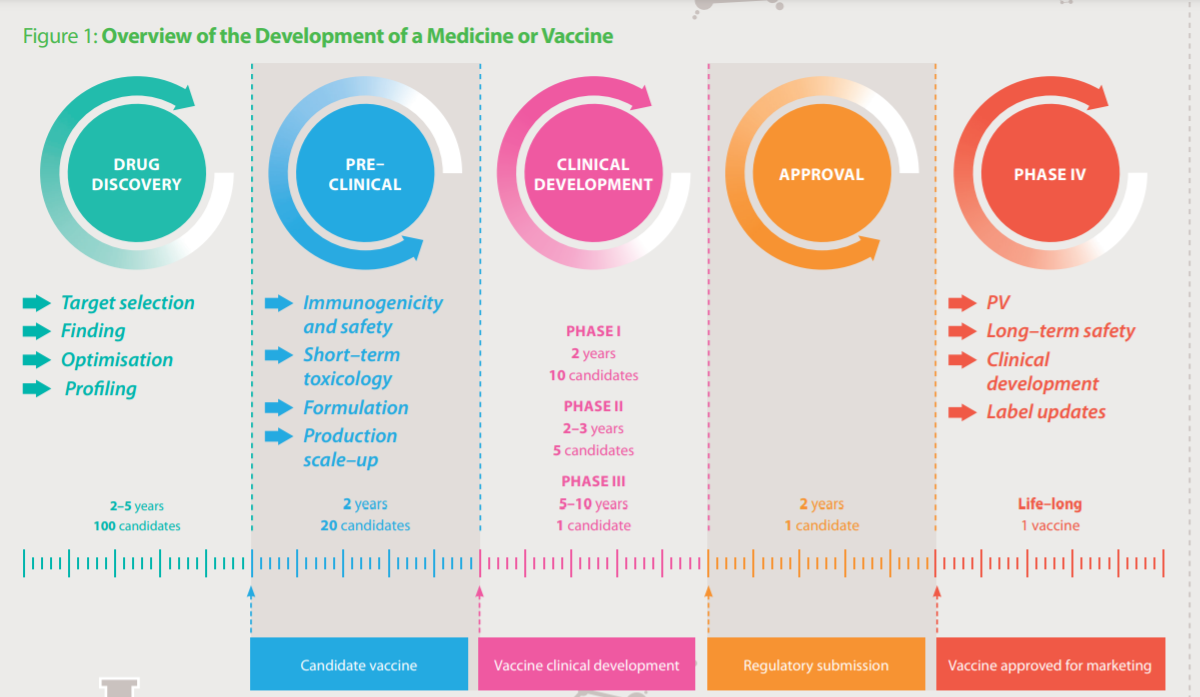
The warp-speed development of Sputnik V was so unprecedented that the head of the Russian Health Ministry’s ethics board, Alexander Chuchalin, resigned his post a day before the vaccine was approved.
“It is impossible to guarantee sustainable safety by reducing the testing period to 4-6 weeks,” Chuchalin told the media shortly before stepping down.
Later in a November 2020 interview, Chuchalin described Sputnik V’s “deep ethical issues” as a matter of “understanding where is good and where is evil”.
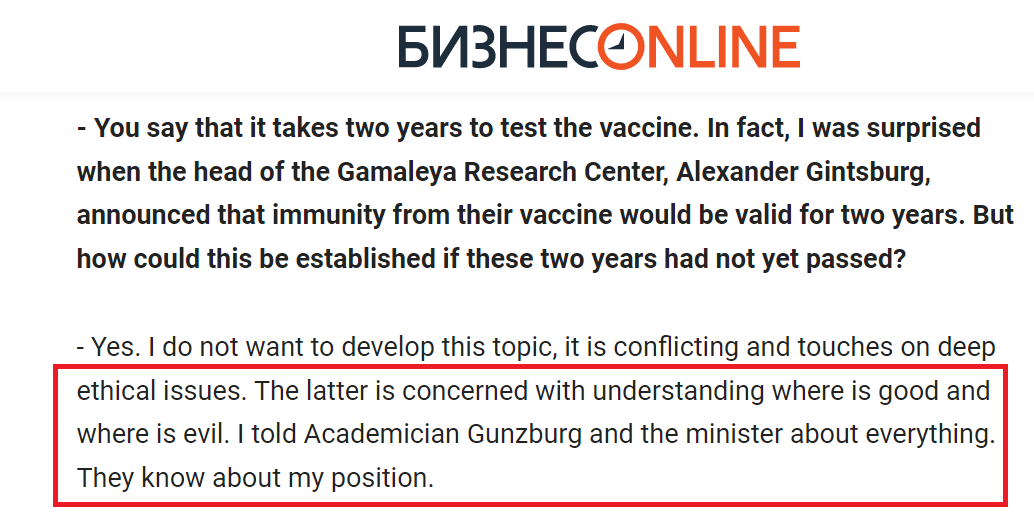
Susan: How did the Russian government justify reducing a ten-year process to two months?
Edward: They claimed that the platform used to develop Sputnik V had already been proven safe and effective. It hadn’t. But whatever.
During an April 20, 2020 videoconference with Putin, Gamaleya Center director Alexander Gintsburg promised Russia’s president that his institute could use a preexisting genetic template to create a COVID vaccine “in a very limited time frame, within a few months.”
Gintsburg explained that in 2015, the Gamaleya Center had created a “technological platform” that used “virus-like particles” to deliver genetic material to cells. The same technology could be used to develop a COVID vaccine, he assured Putin.
Gintsburg stressed that the platform was safe and effective, as evidenced by Gamaleya’s Ebola vaccine, which was registered in Russia and subjected to “extensive” testing in Guinea. He noted that the vaccine template was later modified to develop a serum against Middle East Respiratory Syndrome (MERS).
What Gintsburg didn’t mention was that up to that point, Gamaleya’s “technological platform” had yet to produce a single drug approved for use outside of Russia. In fact, the institute’s “proven” genetic platform had barely been tested.
Gamaleya’s Ebola vaccine was administered to 2,000 people in Guinea a year after the African nation was declared Ebola-free in June 2016. The experimental vaccine was not approved for use in Guinea when hemorrhagic fever returned to the country in February 2021.
As for Gamaleya’s MERS vaccine: It’s been indefinitely shelved without completing clinical trials. The vaccine was administered to 268 people as part of combined Phase I-II studies. It is currently approved for use in zero countries. It is not even registered in Russia.
Using this completely unproven platform, the Gamaleya Center claimed it was able to create Sputnik V in a mere 14 days.
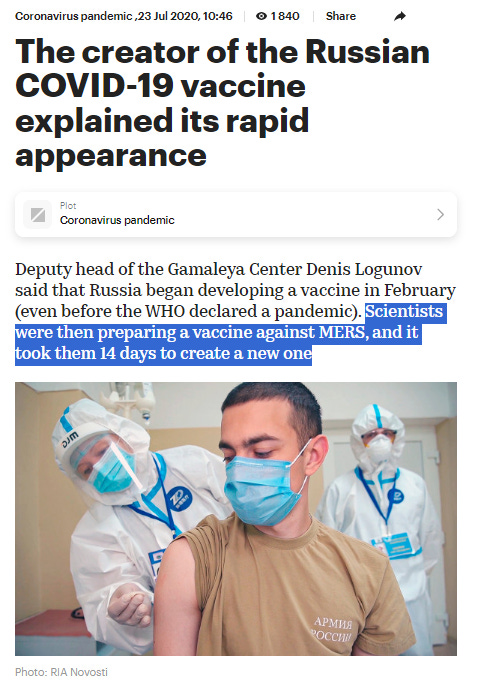
Fourteen days, Susan. Fourteen. The deputy director of the Gamaleya Center boasted that they “literally copy-pasted” their barely tested MERS vaccine to create Sputnik V.
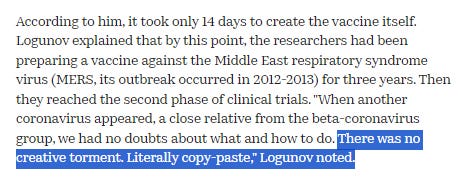
Susan: Yeah, that’s pretty bad. I guess the silver lining is that Russia wasn’t subjected to the West’s Big Pharma clot-shots?
Edward: According to Gintsburg, Sputnik V is “very similar” to the genetic goo developed by Oxford University and AstraZeneca.
This might not be a coincidence. Moscow partnered with AstraZeneca to produce COVID vaccines and create vaccine “cocktails”—a relationship that lasted until autumn 2022, when Russian pharma firm R-Pharm, citing lack of demand, suspended domestic production of AstraZeneca’s clot-shot for export.
Susan: Sorry, what?
Edward: Yup.
The Russian Direct Investment Fund (RDIF), Russia’s sovereign wealth fund and the main financer of Sputnik V, teamed up with R-Pharm in June 2020 to manufacture the Gamaleya Center’s vaccine. A month later, R-Pharm signed a deal to produce AstraZeneca’s shot in Russia.
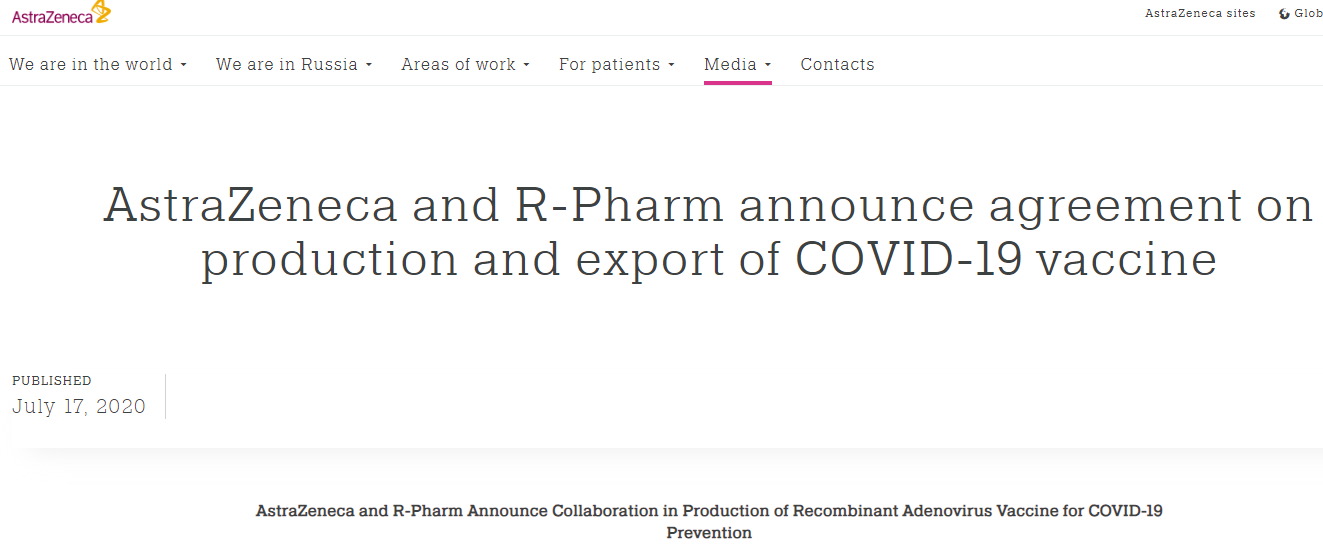
A statement released by AstraZeneca on July 17, 2020 explained:
In accordance with the agreement, R-Pharm will use technological capabilities to implement the project. The cell line and adenoviral vector have been transferred to Russia, and it is planned to produce the antigen and release the finished dosage form here.
At the same time, Russia will be one of the hubs for the production and supply of the vaccine to international markets. It is expected that exports will be organized to more than 30 countries around the world, including the Middle East, the Balkan region and the CIS countries.
AstraZeneca is confident that together with R-Pharm it will be able to provide the vaccine to millions of people in the most effective way.
In other words: As early as July 2020, AstraZeneca had transferred technology to Russia for the manufacture and export of its genetic shot.
Then in December 2020, the Gamaleya Center, AstraZeneca, RDIF and R-Pharm signed an agreement on the creation of a Sputnik V-AstraZeneca vaccine hybrid.
Putin praised the cooperation agreement as a “compelling example of combining research forces, technologies and investment in order to achieve a common goal, which is to protect the lives, health and safety of millions of people on the planet.”
Russia’s president added that the partnership between Gamaleya, RDIF, R-Pharm, and AstraZeneca served as a shining example of “what the G20 recommended and what the United Nations have repeatedly called for when addressing experts around the world. I am talking about joining efforts.”
The partnership included joint trials for an AstraZeneca-Sputnik V combo-shot. As Gintsburg explained, the tests would “not require any big investment and long time simply because the two technologies that underpin AstraZeneca’s vaccine and Sputnik V are very similar.”
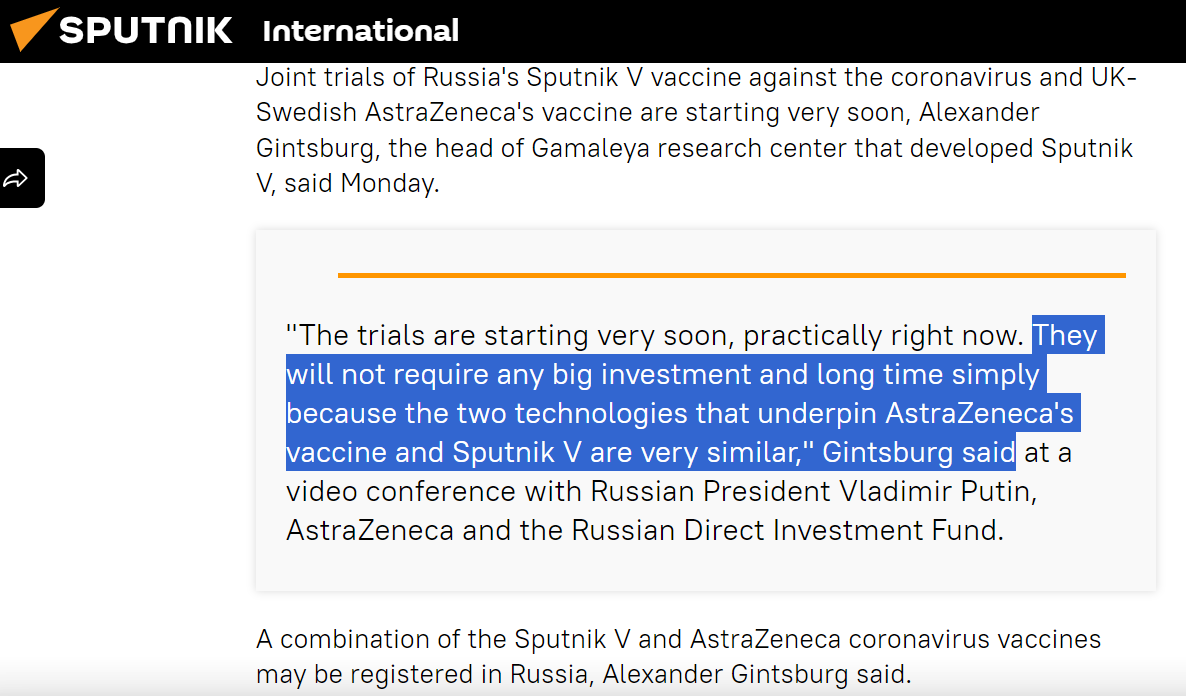
He added that the end goal would be the registration of a Sputnik V-AstraZeneca hybrid in Russia.
Susan:
Edward: I know, right?
It’s rather difficult to believe that Sputnik V was created as a safe alternative to Western big pharma clot-shots when Russia partnered with Western big pharma with the intention of manufacturing Western big pharma clot-shots, both for export and for use inside Russia.
By the way: The Russian government continued to express solidarity with its British-Swedish big pharma friend even as nations around the world suspended use of AstraZeneca’s blood clot-causing vaccine.
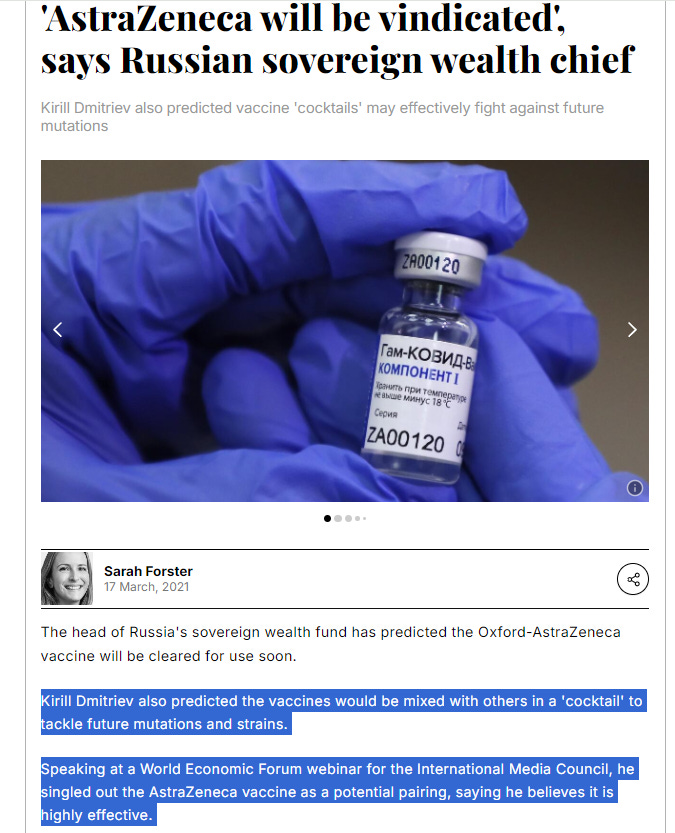
Susan: The article you just cited says that RDIF CEO Kirill Dmitriev praised Russia’s partnership with AstraZeneca while speaking at a World Economic Forum webinar…
Edward: Oh yeah I forgot to mention: Dmitriev attended Stanford and Harvard Business School before working at Goldman Sachs and McKinsey & Company.
He is a WEF Young Global Leader (Class of 2009).
Here is his fancy Davos profile, which is still available on the WEF’s website:
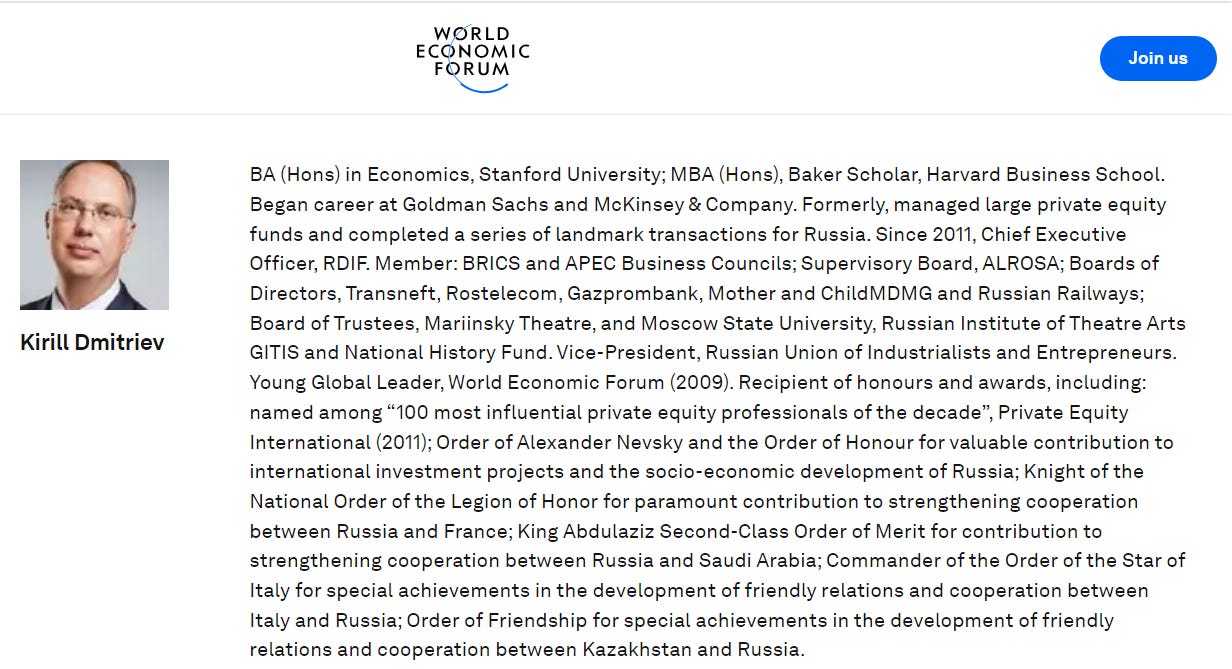
Susan:
Edward: I know, Susan. I know.
Anyway. As late as September 2022, R-Pharm was reportedly still manufacturing AstraZeneca goo and shipping it to Russia’s allies in the Global South.
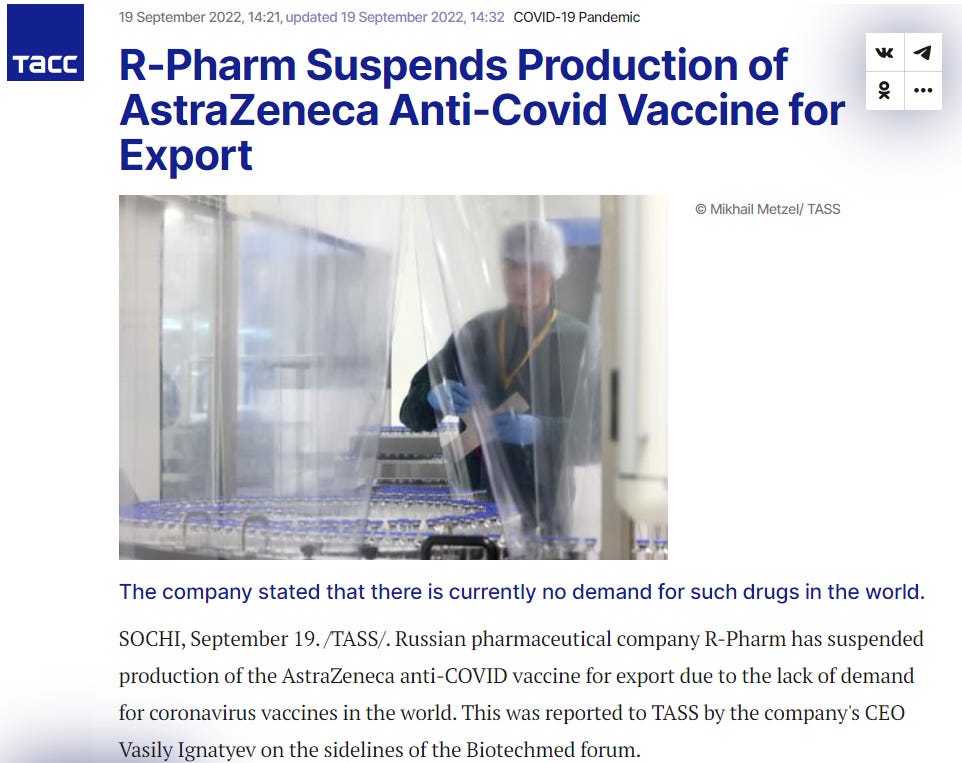
Because that’s what friends are for.
There was something else I wanted to tell you…
Susan: Please don’t tell me that Schwab rent-boy Herman Gref was also involved in Sputnik V’s development.
Edward: Schwab rent-boy Herman Gref was also involved in Sputnik V’s development.

Sberbank was “involved in the work to create” Sputnik V and helped “ensure the transfer of technologies to production sites”, Gref revealed to Russian outlet RBC in April 2021.
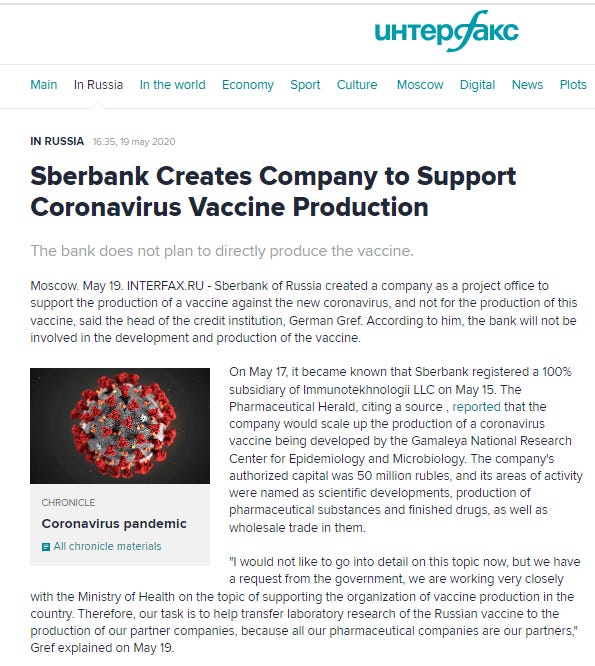
In May 2020, Sberbank created a subsidiary, Immunotekhnologii LCC, to provide logistics and support for COVID vaccine production in Russia. Until March 2021, the Sber-owned company was the sole supplier of Sputnik V to Russia’s regions.
The Sberbank CEO was so confident in Sputnik V’s safety and efficacy that he volunteered to get injected with the drug in April 2020, four months before the vaccine was approved for emergency use in Russia.

“Yes, I got vaccinated with Sputnik V in April [2020]. There were no other options then. We were tasked with project support for the production of the vaccine, the transfer of technology from the science sector to industry. When I saw that Academician Gintsburg and his team from the Gamaleya Center got vaccinated, taking responsibility upon themselves, I decided to join them,” Gref explained in an interview with TASS.
I’m not exactly sure why the CEO of Russia’s largest bank was so intimately involved in the genesis of Sputnik V, but I’m sure there’s a perfectly good and harmless reason.
Sberbank cares so much about public health that it even ran an ad telling Russians that they needed to get injected before they could go outside or remove their face diapers. I have provided English subtitles for those who don’t speak Russian/cat:
Susan: Let’s change the subject before I vomit a fur ball. What about Sputnik’s safety data?
Edward: There is no publicly available data on post-vaccination complications in Russia. Accredited medical organizations and professionals can report suspected adverse events to Roszdravnadzor’s Pharmacovigilance 2.0 database. However, information submitted to the registry is not available to the public and Russia’s Ministry of Heath has stonewalled attempts by lawmakers to obtain safety and efficacy data.
The final results of Sputnik V’s Phase III trials were designated a “commercial secret” and withheld from the public.
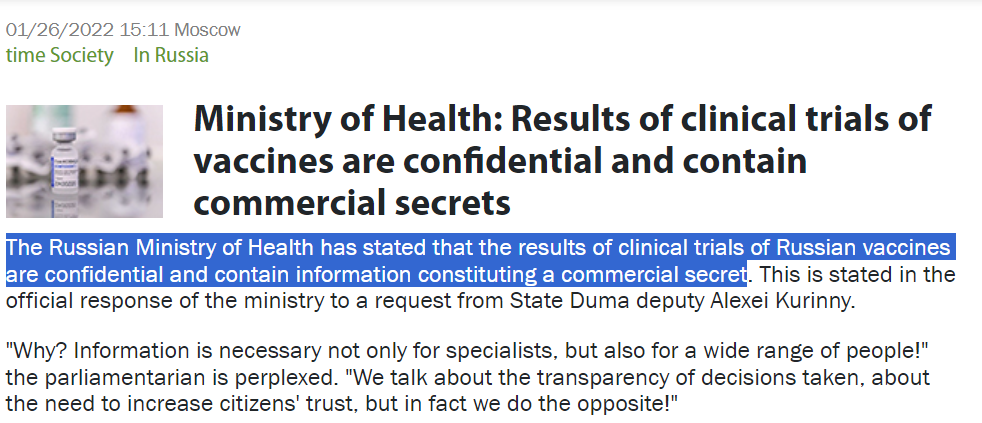
In October 2023, the State Duma Committee on Health Protection rejected a bill that would have required drug developers to release the final results of their clinical trials.
“The fact is that nothing is registered in Russia at all. Therefore, it is very difficult to understand how many serious complications there are. There are many cases, and we can say that they are related to the vaccine. There is a lot to say. Or you can stick your head in the sand and say that there is nothing at all,” Pavel Vorobyov, Chairman of the Moscow Scientific Society of Physicians, said in September 2021.
A month later, Russian doctors and medical professionals gathered in St. Petersburg to compare notes about what they were seeing in connection to the country’s mass vaccination campaign. Susan, I very strongly urge you to read Katyusha.org’s report about what was said at this conference. It’s a real eye-opener:
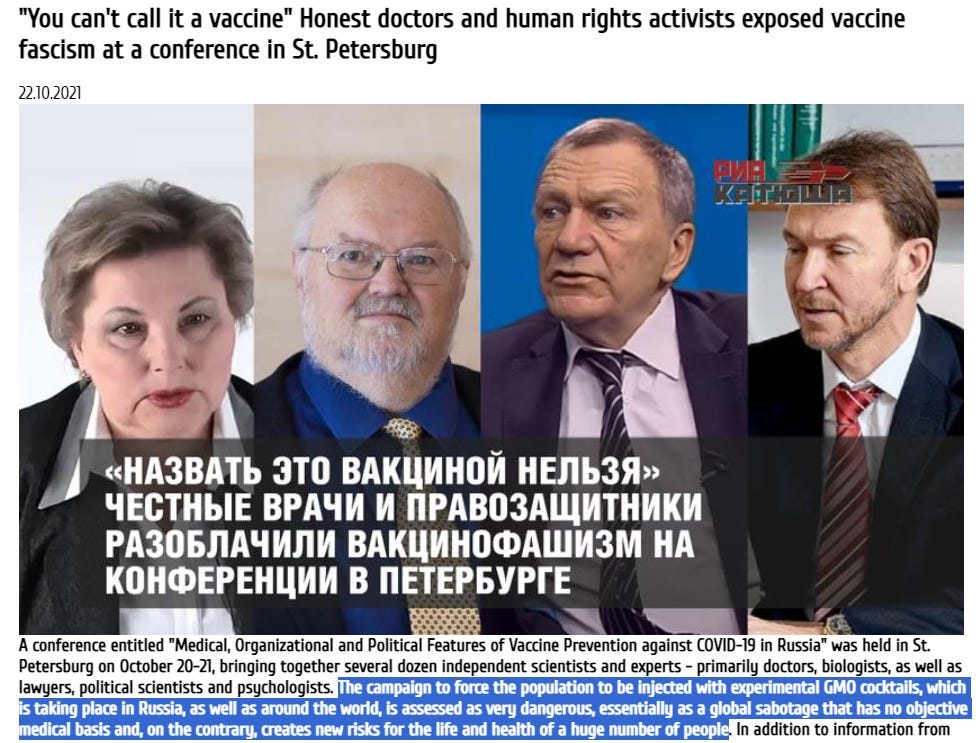
(In order to silence medical workers, the government later threatened fines and prison time for anyone suspected of discrediting the country’s safe and effective COVID vaccine.)
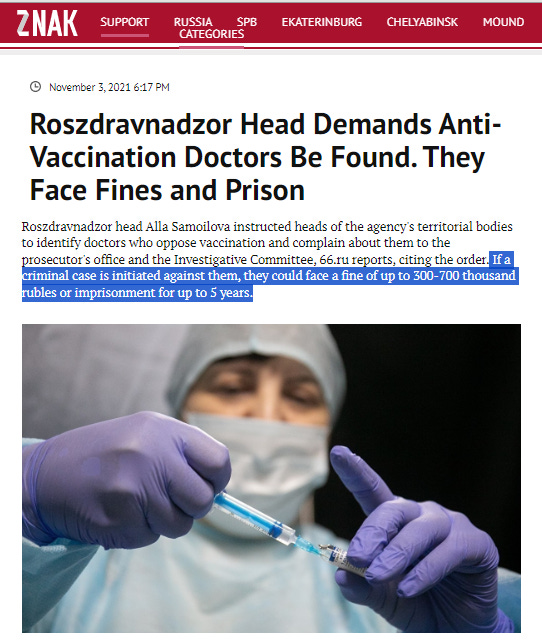
Despite a coordinated campaign to censor “anti-vax” doctors, reports surfaced in Russian media about post-vaccination complications—including vax-linked deaths.
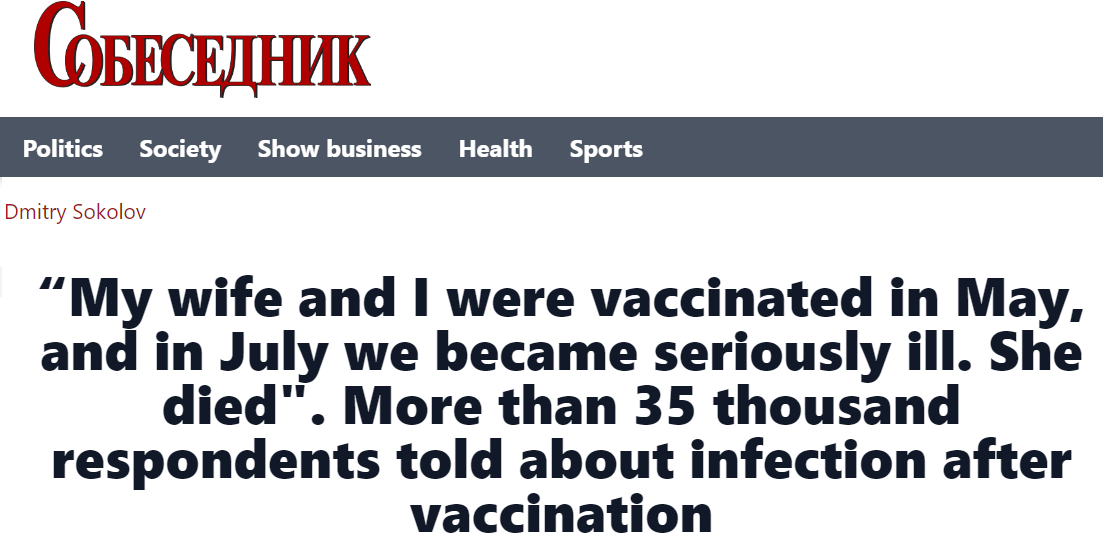
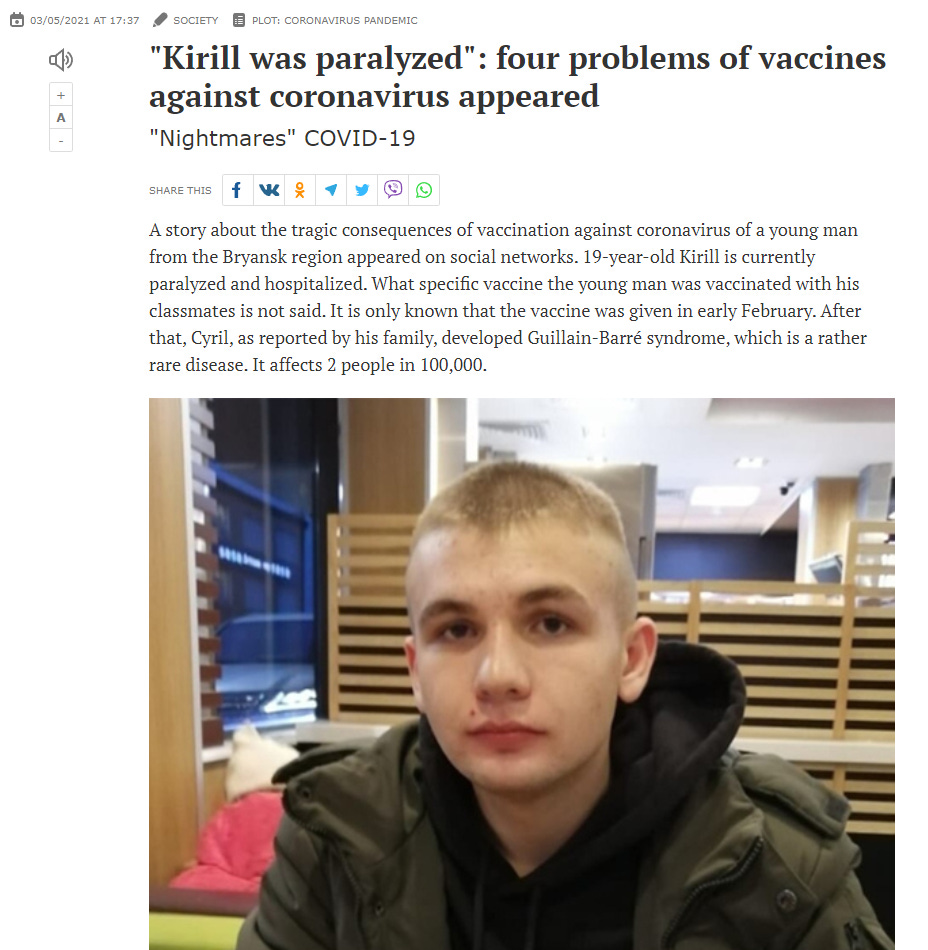
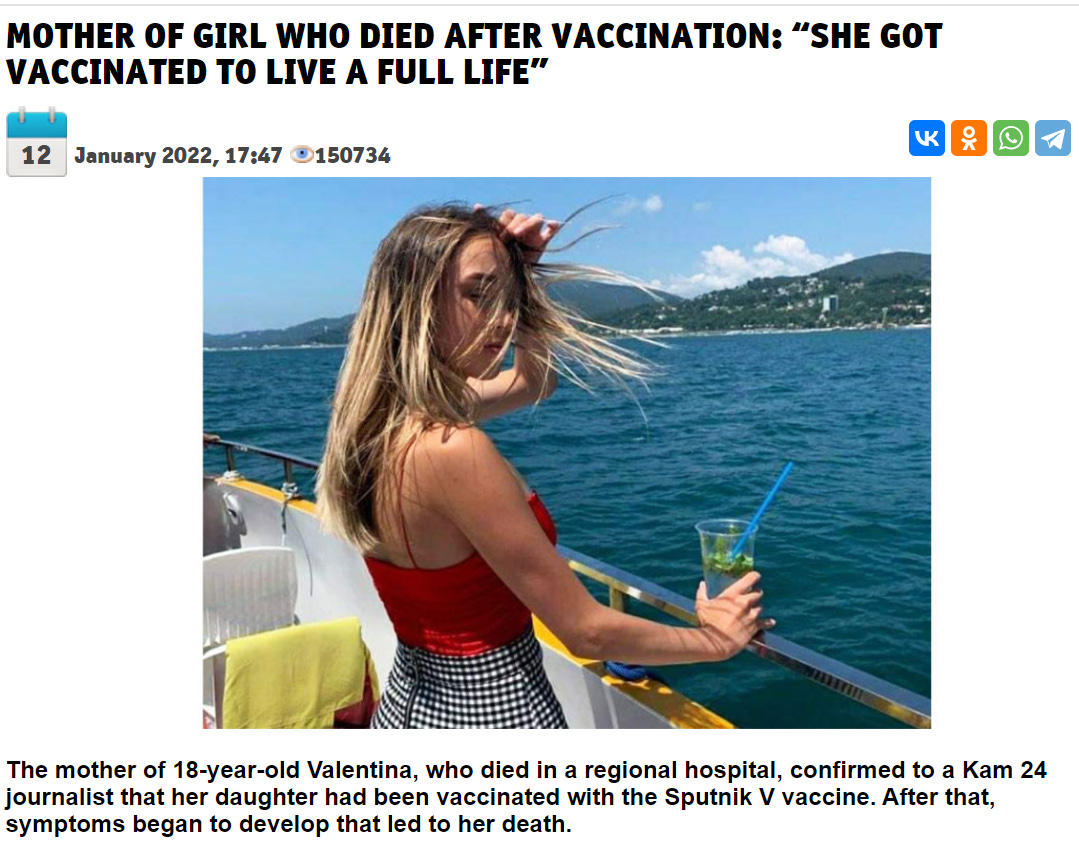
After reviewing Sputnik V’s safety record in countries that report adverse reactions, Russian outlet Krasnaya Vesna determined in December 2021 that “in terms of the frequency of expected mild and severe (requiring hospitalization) side effects, [Sputnik V] is comparable to foreign counterparts.”
For example, post-vaccination data collected by Argentina’s Ministry of Health suggests that Sputnik V is comparable to AstraZeneca in terms of safety:
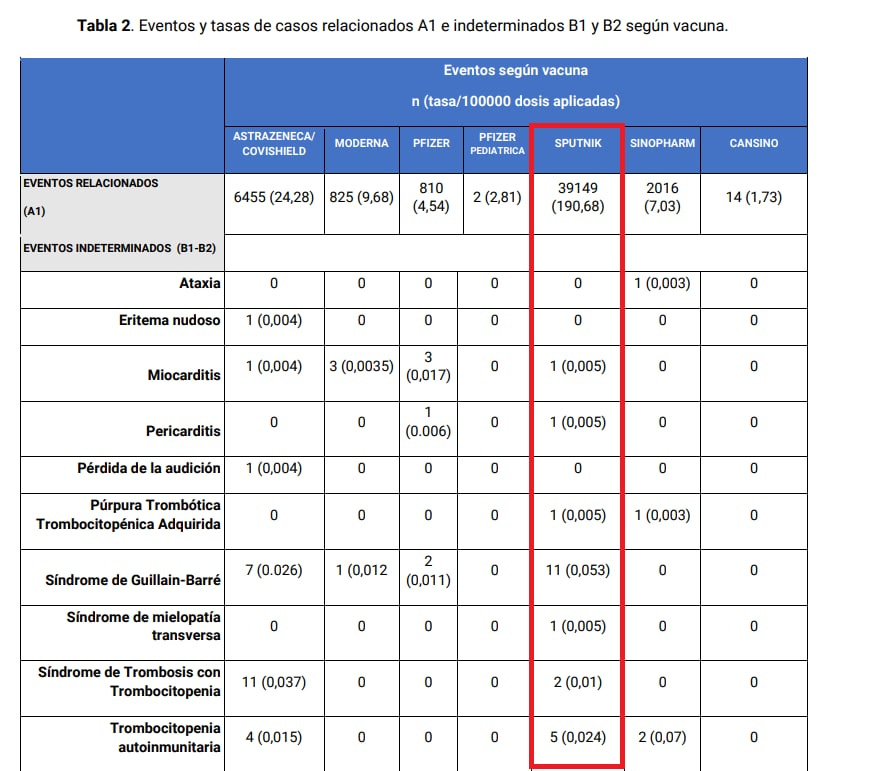
In April 2023, Russia’s Federal Service for Surveillance in Healthcare (Roszdravnadzor) acknowledged that COVID vaccines were responsible for a “significant proportion” of adverse drug reactions in the country. The agency did not disclose which vaccine(s) were linked to these reports.
Responding to Roszdravnadzor’s statement, Moscow City Duma Deputy Ekaterina Engalycheva (KPRF) compared Sputnik V with AstraZeneca’s shot and asked (rhetorically) if anyone would be held responsible for the “unnecessary deaths and disabilities” caused by Russia’s “flagship” genetic injection:
Of course, there are side effects from Sputnik. I listed them from the appeals I received in the very first months of the vaccination campaign and sounded the alarm!
In my opinion, these side effects are the same as from other similar COVID vaccines, in particular from AstraZeneca, with which Sputnik is almost identical, and made according to the same principle, as [Gamaleya Center Director Alexander] Gintsburg himself spoke about (you can listen to what he said at the end of this video)!
And when today federal channels are finally filming reports on record-breaking mortality in Europe and the USA from Pfizer, Moderna and AstraZeneca, I personally am very happy … but I also understand why our mortality rate is growing, why do we have a demographic hole exactly one year after the start of this vaccination ...
I am very glad that Roszdravnadzor officially admits that there are side effects and unwanted reactions from this “best in the world” vaccine.
[But] who will be responsible for the unnecessary deaths, for the disabilities, for the fact that previously healthy people are getting sick?
The lawmaker added that it was time for the Russian government to halt the use of “experimental liquids” that were still being “forced” on state employees.
More recently, in February of this year, the head of Russia’s League of Patients, Alexander Saversky, claimed that Sputnik V was a “crime” against the Russian people.
Saversky, who serves on the Health Ministry’s Ethics Committee for Clinical Approbation, revealed that his organization had collected more than 1,000 reports of deaths linked to “anti-COVID” measures, as well as statements from Russians who developed serious complications after being vaccinated.
“[T]he effectiveness and safety [of Sputnik V] have not been proven, and this represents a formal crime. It is not even necessary to prove any connection with deaths, because it is almost impossible to prove—we don’t know how these vaccines work, since clinical studies have not been completed,” Saversky noted.
Susan:
Edward: Yes, I agree. Well said, Susan.
Do you have any other questions in celebration of the fourth birthday of Russia’s safe and effective flagship COVID vaccine?
Susan: So it’s the same disgusting genetic slurry everywhere, just with different labels?
Edward: Pretty much.
Susan: There’s a lesson here, somewhere.
Edward: Yes.
Susan: Humans are retarded.
Edward: Yes.
Susan: I have to go now. Thanks for the chat, I guess.
Thank you to Senior Questions Correspondent Susan for taking time out of her busy schedule to speak with me!

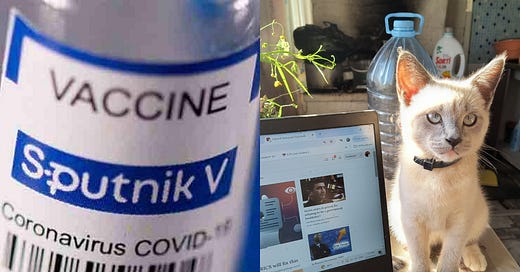



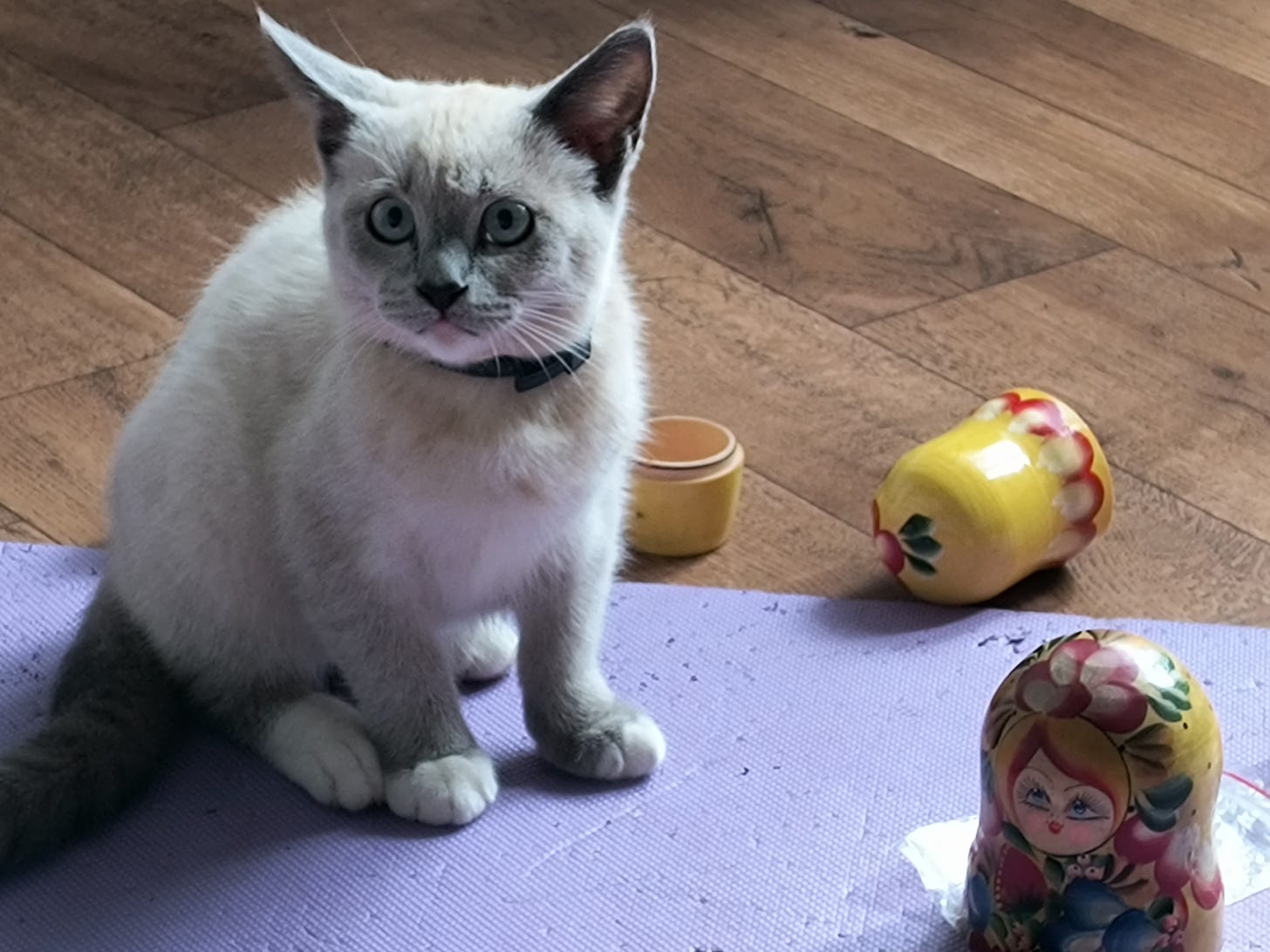

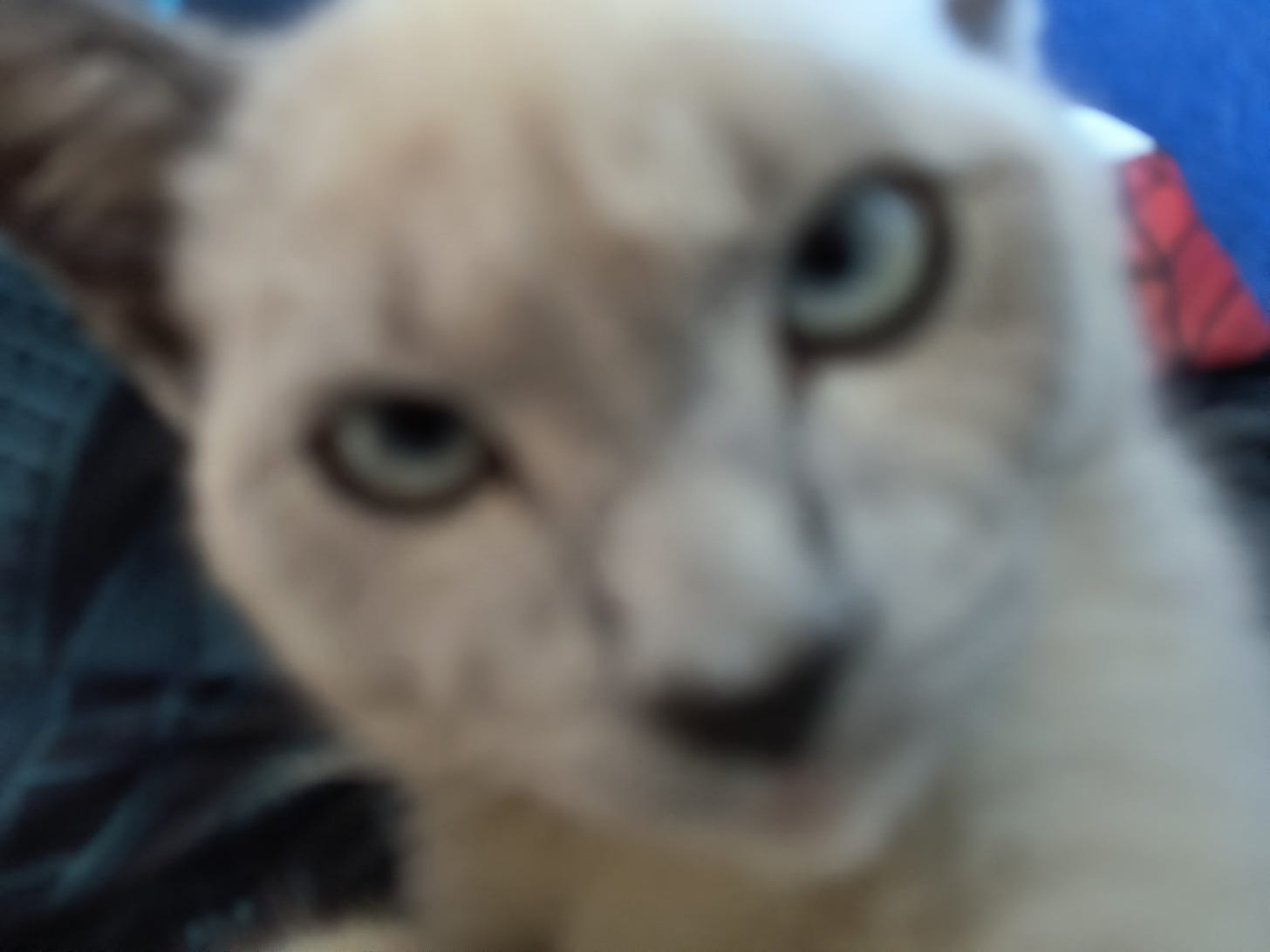

I guess there really isn’t that much difference between the Russian government and the American government.
Global depopulation... It's what Oligarchs Crave!